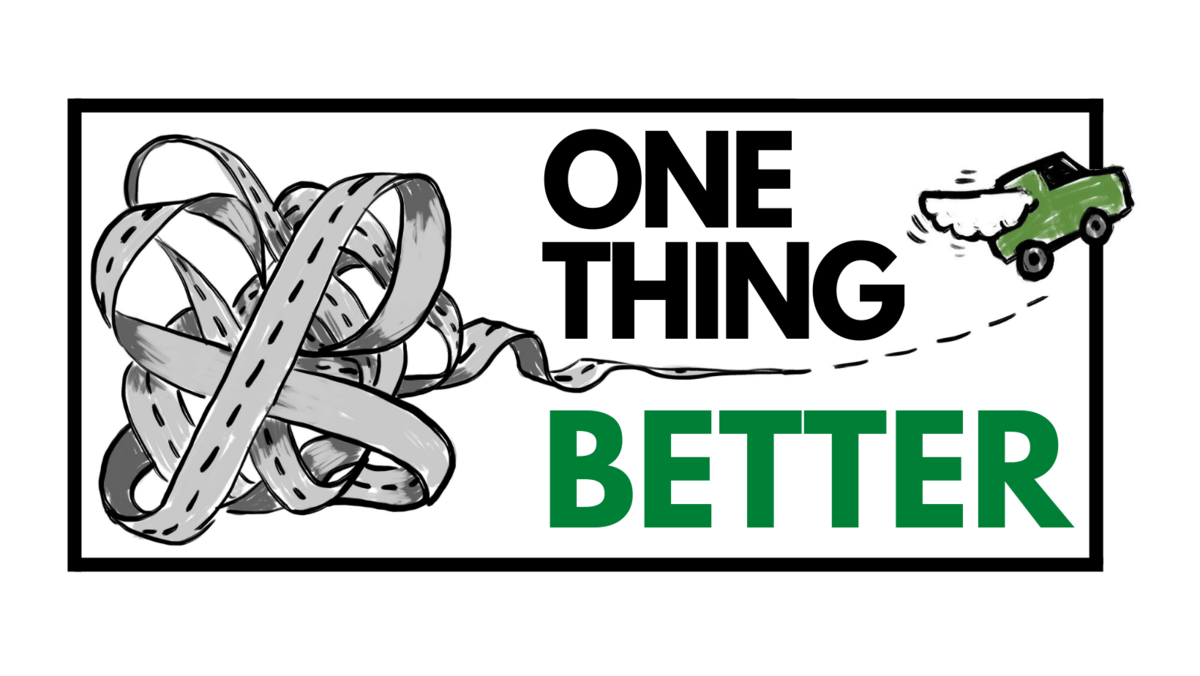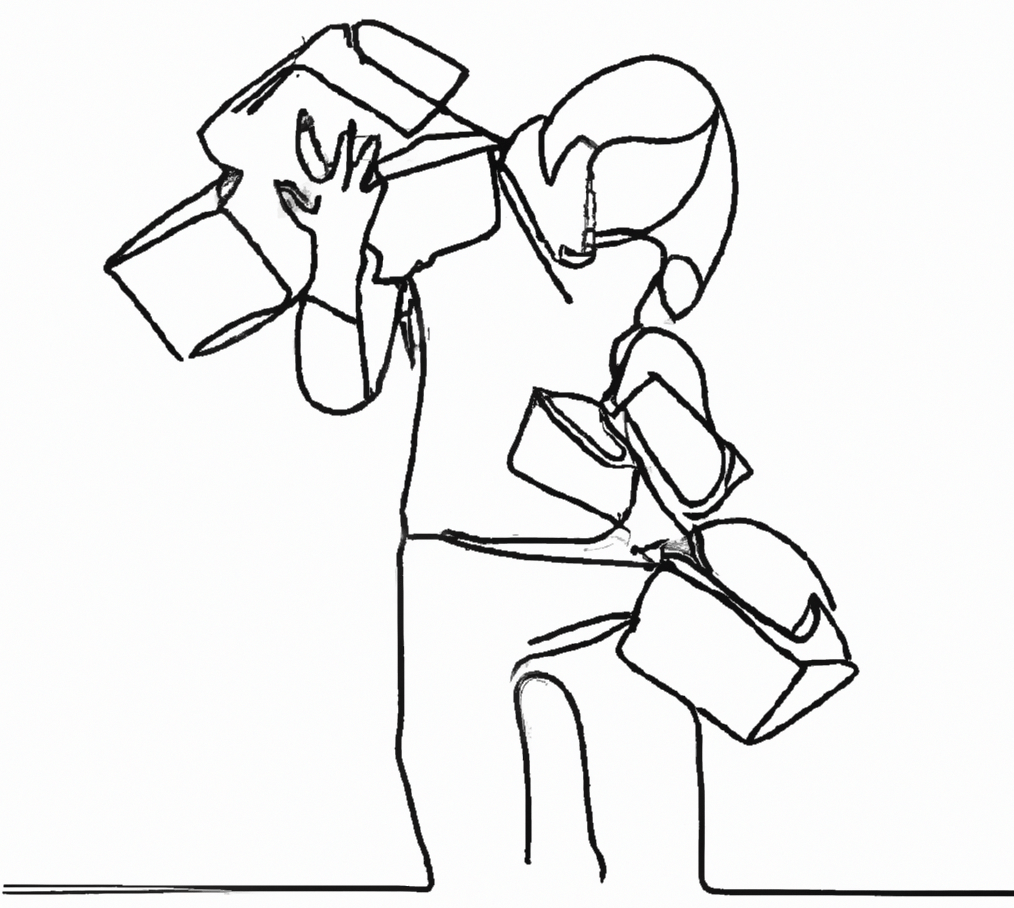- One Thing Better
- Posts
- How to Do the Thing You've Been Avoiding
How to Do the Thing You've Been Avoiding
What if there's no good reason to avoid it?

Welcome to One Thing Better. Each week, the editor in chief of Entrepreneur magazine (that's me) shares one way to level up — and build a career or company you love.
Today’s one thing: The thing you think is a bad idea.
That one thing, better: Maybe try it?

DALL-E 2. Prompt: “one-line drawing of someone hiding behind a wall”
There’s something you’re not doing right now.
You’re not exploring something. Asking for something. Acting on something. Why? Because it’s a bad idea.
But let’s interrogate that for a moment. Do you actually know it’s a bad idea? Like, is it verifiably bad? Road-tested? Experienced? Did you try it before, to horrific results?
My guess: You just think it’s a bad idea, so you ruled it out.
Today I’m going to show you why, sometimes, the thing we think is a liability is really our greatest asset. And I’ll start with how I learned this for myself — with one of America’s favorite comedians.
It all started at 30 Rock…
My LinkedIn followers may recognize this next part, because I recently shared it there. But I’m about to go much deeper…
About a year ago, I interviewed Jimmy Fallon for a cover profile in Entrepreneur. We met in his office at 30 Rockefeller Plaza, and he is exactly like you’d expect — warm, genuine, thoughtful. We had a great conversation that went long beyond our scheduled time.
As we wrapped up, Jimmy invited me to reach out if I had follow-up questions. I said thanks, but that I’d already taken up a lot of his time and I wanted to respect that.
And yet, as I wrote the story, I realized that I’d missed a big question. I really did need to follow up! I debated the wisdom of this. Did he actually want to talk again? Was I being a burden? I tried finishing the story on my own, but it just wasn’t working — I needed a little more from Jimmy. So with some hesitancy, I requested a follow-up call.
It took a week. Jimmy’s busy.

“I really appreciate you squeezing this in,” I said to Jimmy when we reconnected by phone.
“No one ever takes me up on it!” Jimmy replied. “So I was like, yeah! He’s thorough, he’s smart. Let’s do it — I can’t wait.”
“It’s so funny,” I replied, “because I think, oh, following up is a burden.”
“Never,” Jimmy said.
Let’s recap: Jimmy has been interviewed many times, and often offers to answer follow-up questions. Nobody takes him up on it, but I did. And to Jimmy, that wasn’t a burden — it was a sign of thoroughness.
And he appreciates thoroughness.
This moment altered how I think. I started to wonder:
What else do I think is bad, that other people think is good?
You should be wondering the same thing.
Here’s how to figure it out.
Beware the “false consensus effect”
I love this term from psychology. It’s the common belief that other people think exactly like you do — or, in research-speak, that people “see their own behavioral choices and judgments as relatively common and appropriate to existing circumstances.”
As a result, we may do or avoid things because we assume other people think the same.
But we don’t actually know if they think the same.
So, isn’t it worth a closer look?
Like I said at the start of this newsletter: There’s something you’re not doing right now, because you think it’s a bad idea. Maybe it’s an interaction with someone — a thing you want to ask or tell or do with them. Or maybe it’s bigger than that. Maybe it’s a project, a change, a new direction.
It’s time to see if this is really a bad idea. Start with some simple questions, like:
1. Why do I think this is a bad idea?
For example, I thought following up with Jimmy was a bad idea. Why? Because he and I agreed to a certain amount of interview time, and he already gave me more than that.
But in retrospect, that was just why I thought it was a bad idea. I had no idea what anyone else thought, including Jimmy.
So, next question…
2. How do I actually know it’s a bad idea?
There could be a good answer to this. Maybe the thing you’re considering is mean. Or reckless. Or against the law. Those are bad ideas!
But, maybe you’re just considering something… new? Bold? Uncomfortable? Unorthodox?
Do you know it’s a bad idea? Or is this just the false consensus effect at play? Maybe you just assume other people think the way you do?
Well, there’s only one way to find out. Time for the next question:
3. Am I the only one who thinks this?
Can’t hurt to ask! Ask multiple people. Poll your trusted friends and colleagues.
I first learned about the false consensus effect from Katy Milkman, a Wharton professor who studies how people make decisions. I spoke to her for my book, and she told me this:
“If you’re thinking about how do I make a change, or what’s the right change, try to think, ‘Is there social information I can gather from other people who’ve pursued a similar path or faced a similar dilemma or actually made these changes? And what can I copy and paste that worked for them?’ ”
Other people’s experiences! It is a bountiful resource we don’t take enough advantage of.
And if you’re still not sure after that?
There’s only one question left:
4. What’s the worst that can happen if I’m wrong?
Game it out. What truly is the worst-case scenario? That someone says no? That a project fails? That you have to try something else?
My worst-case scenario would have been this: Jimmy Fallon got back on the phone with me, but he was a little annoyed about it.
OK! It’s good to know the potential consequences of our actions. Now you can compare the worst-case scenario against another imagined future, which goes like this:
What happens if I never try it?
Truly, what happens? Are you unfulfilled by the project you never tried? Sad you never opened up to that person? Wasting away at a job you never left?
Now you can compare which is worse — the small risk of a worse-case scenario, or the absolute certainty of not taking action.
Sometimes, the only way to know is to have the experience…
And the experience might surprise you.
Here’s a similar lesson I learned.
I love doing favors for people. And yet, I hate asking for favors. It makes me uncomfortable. Like I’m being an imposition.
But when my book came out last year, I needed help from everyone I knew. That meant calling in every favor I could — from friends, acquaintances, celebrities, and even strangers. So after a lot of hesitation, I started doing it.
Know what happened?

DALL-E 2. Prompt: “one-line drawing of someone jumping out from behind a wall, lots of color”
First of all, people responded with overwhelming enthusiasm. They said yes to almost everything I asked. I’ve never felt more supported.
Then came the real shock. Many of my good friends, who I’d already done many favors for, told me some version of this:
FINALLY. You’ve done so much for me, and I’ve always felt bad that I couldn’t repay you. Now I’m so happy I can.”
That’s when I realized my error. I always thought that asking for favors was a burden to others. But in truth, the burden was NOT asking for favors! I was STIFLING relationships because of it!
The thing I thought was a liability was actually an asset.
Now I act differently. I ask for favors. I’m still not comfortable doing it; you can’t easily change who you are. But at least I know how other people think. And I know that they don’t think like me. And I know that’s a good thing. A liberating thing! It means I live in a world of possibilities, where I can be wrong in the best possible way.
Sometimes we turn over a rock and find a diamond underneath.
But we’d never know, unless we’re willing to turn over the rock.
So, let’s get back to that thing you think is a bad idea.
Why do you think it’s bad? How do you really know? Do others think the same? And honestly, what is the worst that can happen? Maybe it’s worth the risk; maybe it is not. That’s for you to decide. There are no guarantees. But I will say this, just to help you engage with a world of limitless potential: Maybe you should just do it, so that you know what’s on the other side of that decision. So that your life is larger. More informed. So that you have the experience. So that you know. And so that other people — the people you like, the people you love, or just the people you want to attract or know better — can benefit from the thing you were afraid to give them.
That’s not such a bad idea, is it?
And that’s how to do one thing better.
You Don’t Have to Do Everything

DALL-E 2. Prompt: "one-line drawing of a person carrying many objects in their hands, but accidentally dropping some of them"
Did you catch last week’s newsletter? It was about how to become incredibly valuable — by focusing on what you’re great at, instead of trying to do everything else. I hope it’s helpful!
Let's Connect!
New to the newsletter? Subscribe for free and take control of your future.
💌 What do you think? Let me know!
📕 Order my book to future-proof your career!
🎧 Latest podcast: What Your Burnout Is Trying To Tell You